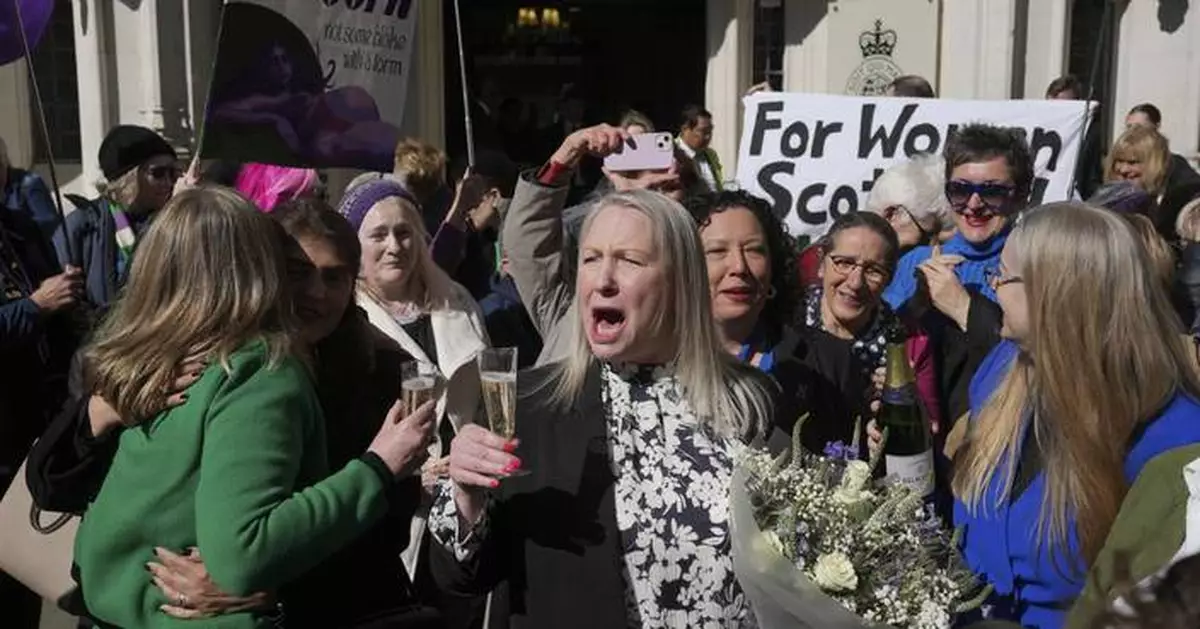LONDON (AP) — In a judgment with far-reaching implications, the U.K. Supreme Court ruled Wednesday that a woman is someone born biologically female and that transgender women are excluded from that legal definition.
The ruling was cheered by some feminists who have campaigned to safeguard rights for women on the basis of biological sex. Trans rights campaigners were disappointed, and worry about the ruling's implications for transgender women.
Click to Gallery
Women's rights activists celebrate outside the Supreme Court to challenge gender recognition laws, in London, Wednesday, April 16, 2025. (AP Photo/Kin Cheung)
Women's rights activists celebrate outside the Supreme Court to challenge gender recognition laws, in London, Wednesday, April 16, 2025. (AP Photo/Kin Cheung)
Marion Calder, right, and Susan Smith, left, from For Women Scotland, celebrate outside after the U.K. Supreme Court ruled that a woman is someone born biologically female, excluding transgender people from the legal definition in a long-running dispute between the feminist group and the Scottish government, in London Wednesday, April 16, 2025. (AP Photo/Kin Cheung)
Women's rights activists celebrate outside the Supreme Court to challenge gender recognition laws, in London, Wednesday, April 16, 2025. (AP Photo/Kin Cheung)
Women's rights activists celebrate outside the Supreme Court to challenge gender recognition laws, in London, Wednesday, April 16, 2025. (AP Photo/Kin Cheung)
Women's rights activist celebrates outside the Supreme Court to challenge gender recognition laws, in London, Wednesday, April 16, 2025. (AP Photo/Kin Cheung)
Marion Calder and Susan Smith from For Women Scotland, celebrate outside the Supreme Court to challenge gender recognition laws, in London, Wednesday, April 16, 2025. For Women Scotland is challenging the Scottish Government over whether trans women can be regarded as female for the purposes of the 2010 Equality Act. (AP Photo/Kin Cheung)
Women's rights activists celebrate outside the Supreme Court to challenge gender recognition laws, in London, Wednesday, April 16, 2025. (AP Photo/Kin Cheung)
Marion Calder, center, and Susan Smith, left, from For Women Scotland, celebrate outside after the U.K. Supreme Court ruled that a woman is someone born biologically female, excluding transgender people from the legal definition in a long-running dispute between the feminist group and the Scottish government, in London Wednesday, April 16, 2025. (AP Photo/Kin Cheung)
The court was asked to determine the definition of a woman under Britain’s 2010 Equality Act, which sets out protections against discrimination on the basis of sex, sexual orientation, race, religion and other traits.
The case stems from a 2018 law passed by the Scottish Parliament calling for 50-50 balance of men and women on the boards of Scottish public bodies. Its definition of women included trans women whose gender is legally affirmed with a Gender Recognition Certificate.
A feminist group, For Women Scotland, challenged that in court, saying the Scottish government had overstepped its powers by effectively redefining the meaning of “woman.”
The group lost a ruling in a Scottish court in 2022 but was later granted permission to take its case to the Supreme Court, which held hearings in November.
Justice Patrick Hodge said he and four other judges ruled unanimously that “the terms woman and sex in the Equality Act refer to a biological woman.”
In the law, “the words ‘sex,’ ‘woman’ and ‘man’ … mean (and were always intended to mean) biological sex, biological woman and biological man,” the judges wrote.
The judges argued that a broader definition that includes transgender people would make the Equality Act “incoherent and unworkable.”
“We can identify no good reason why the legislature should have intended that sex-based rights and protections under the (Equality Act) should apply to these complex, heterogenous groupings, rather than to the distinct group of (biological) women and girls (or men and boys) with their shared biology leading to shared disadvantage and discrimination faced by them as a distinct group,” they wrote.
The ruling makes no mention of intersex people, who also are not explicitly protected under the Equality Act.
As in other countries, the issue has polarized opinion, pitting transgender rights campaigners against “gender critical” feminists, who argue that trans women's rights should not come at the expense of those who are born biologically female.
For Women Scotland said it was “absolutely jubilant” at the ruling. “Harry Potter” author J.K. Rowling, a prominent supporter of the group, said the court victory had “protected the rights of women and girls across the U.K.”
But LGBTQ+ charity Stonewall said there is “deep concern” surrounding the ruling's consequences.
Vic Valentine, manager of the group Scottish Trans, said the judgment “seems to have totally missed what matters to trans people — that we are able to live our lives, and be recognized, in line with who we truly are.”
Amnesty International U.K. described the ruling as “disappointing,” but said it is “important to stress that the court has been clear that trans people are protected under the Equality Act against discrimination and harassment.”
The Supreme Court judges stressed that their ruling should not be seen as an attack on transgender people. They said it “does not remove or diminish the important protections … for trans people” under the Equality Act, which bans discrimination on the basis of gender reassignment.
It’s unclear what the ruling will mean in practice.
The judgment highlights a range of spaces and services that could be intended just for women, including “rape or domestic violence counselling, domestic violence refuges, rape crisis centers, female-only hospital wards and changing rooms.” The law already allowed for trans women to be excluded from single-sex spaces under certain circumstances, but Wednesday’s ruling appears to make such a ban easier.
The ruling could also see transgender female athletes excluded from participating in women’s and girls sports, and there could be ramifications in workplaces.
But much depends on how the ruling is interpreted and implemented.
Hannah Ford, an employment partner at law firm Stevens & Bolton, told the BBC that because of the ruling, ensuring workplaces are welcoming places for trans people will be “an uphill battle.”
She said one positive aspect was that “at least we have simplicity and clarity. So it is in one sense a triumph of sense over legal incoherency and legal fiction.”
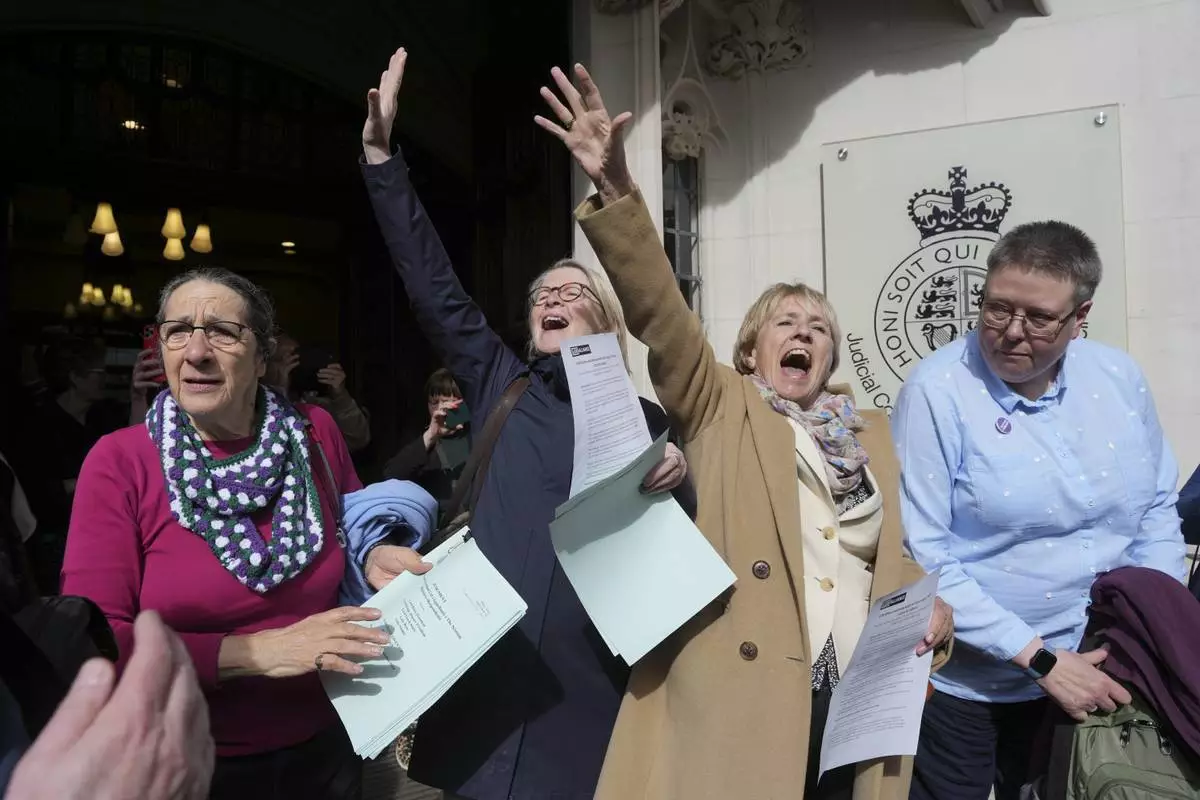
Women's rights activists celebrate outside the Supreme Court to challenge gender recognition laws, in London, Wednesday, April 16, 2025. (AP Photo/Kin Cheung)
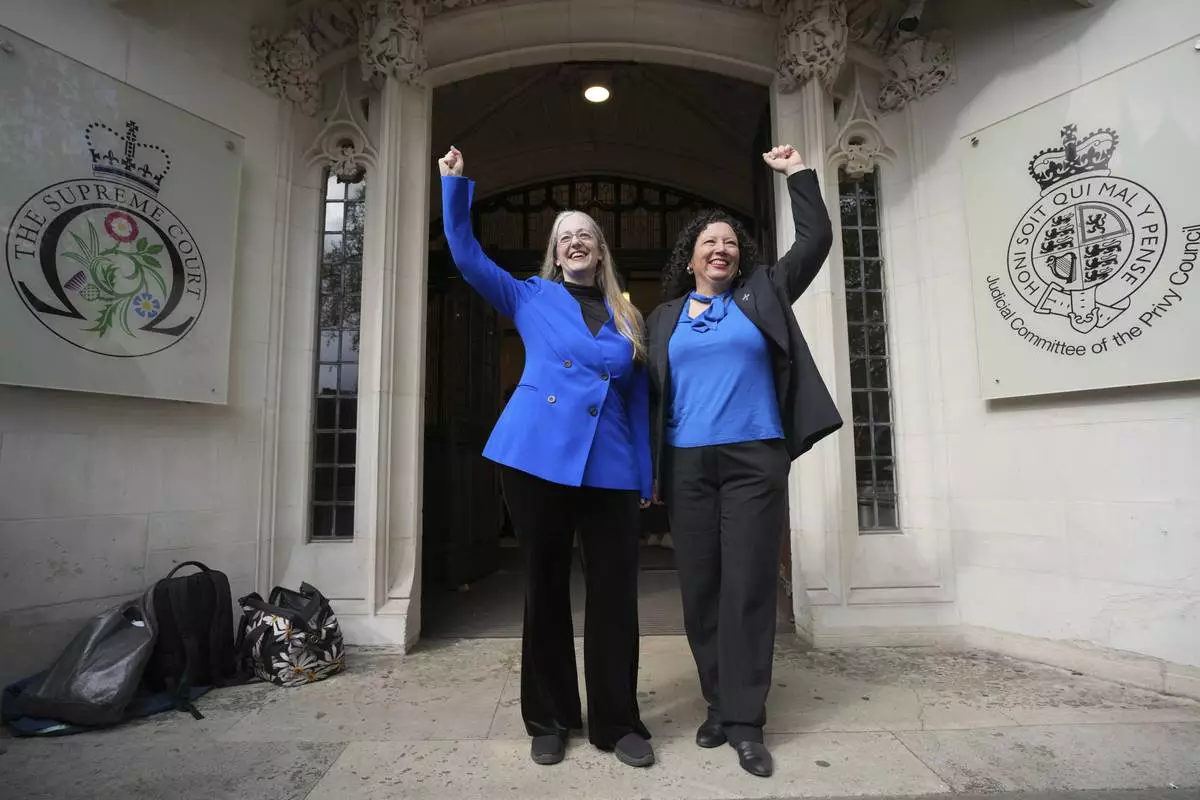
Women's rights activists celebrate outside the Supreme Court to challenge gender recognition laws, in London, Wednesday, April 16, 2025. (AP Photo/Kin Cheung)
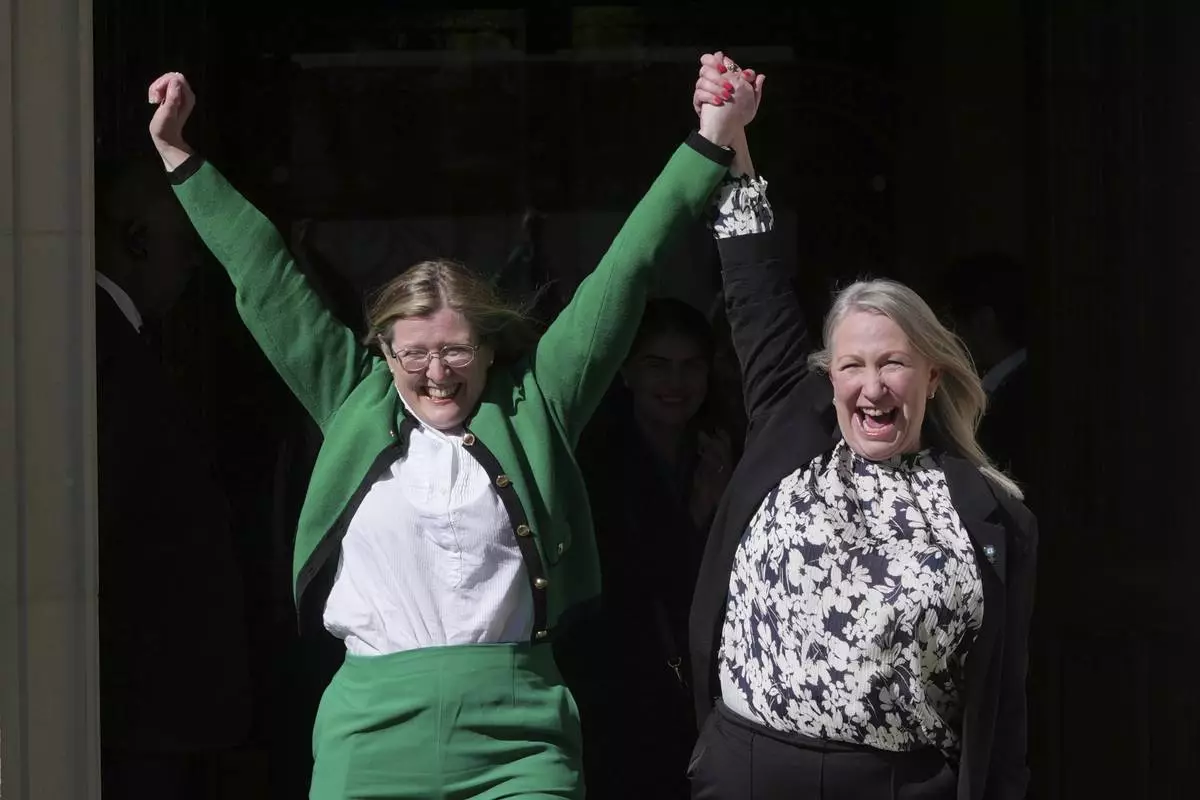
Marion Calder, right, and Susan Smith, left, from For Women Scotland, celebrate outside after the U.K. Supreme Court ruled that a woman is someone born biologically female, excluding transgender people from the legal definition in a long-running dispute between the feminist group and the Scottish government, in London Wednesday, April 16, 2025. (AP Photo/Kin Cheung)

Women's rights activists celebrate outside the Supreme Court to challenge gender recognition laws, in London, Wednesday, April 16, 2025. (AP Photo/Kin Cheung)
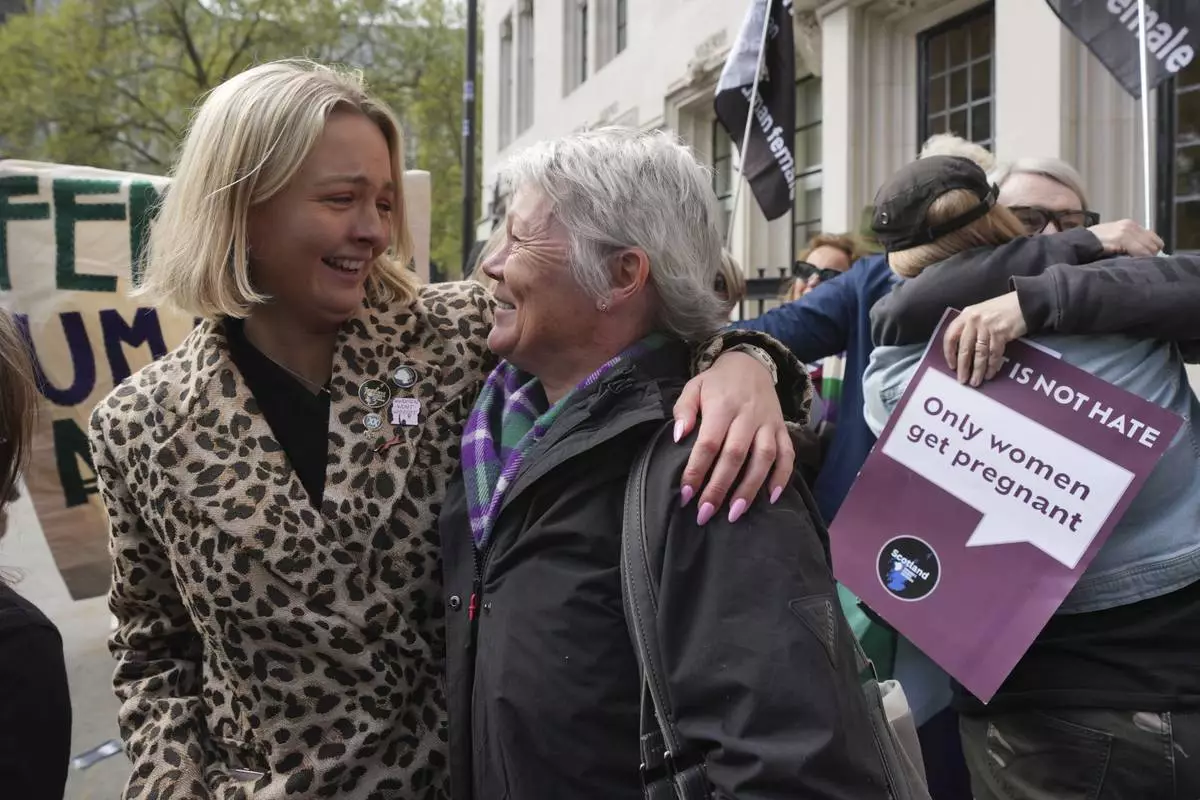
Women's rights activists celebrate outside the Supreme Court to challenge gender recognition laws, in London, Wednesday, April 16, 2025. (AP Photo/Kin Cheung)
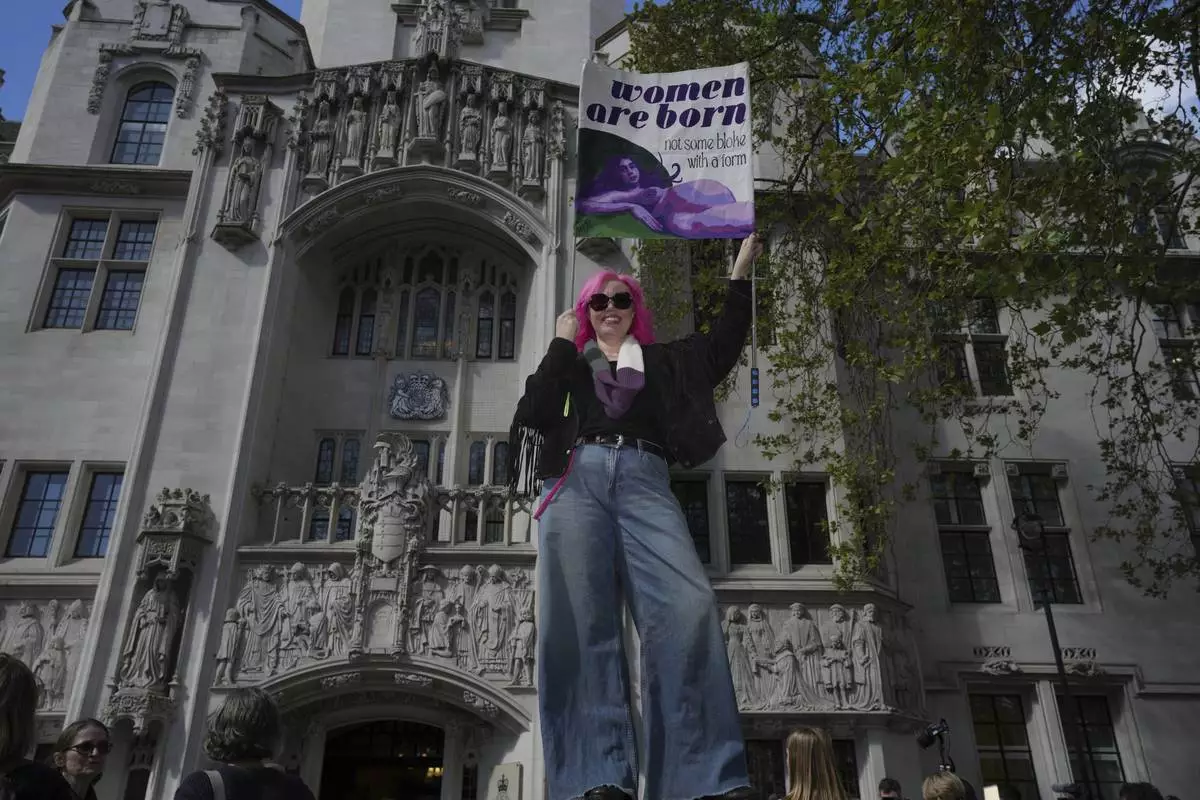
Women's rights activist celebrates outside the Supreme Court to challenge gender recognition laws, in London, Wednesday, April 16, 2025. (AP Photo/Kin Cheung)
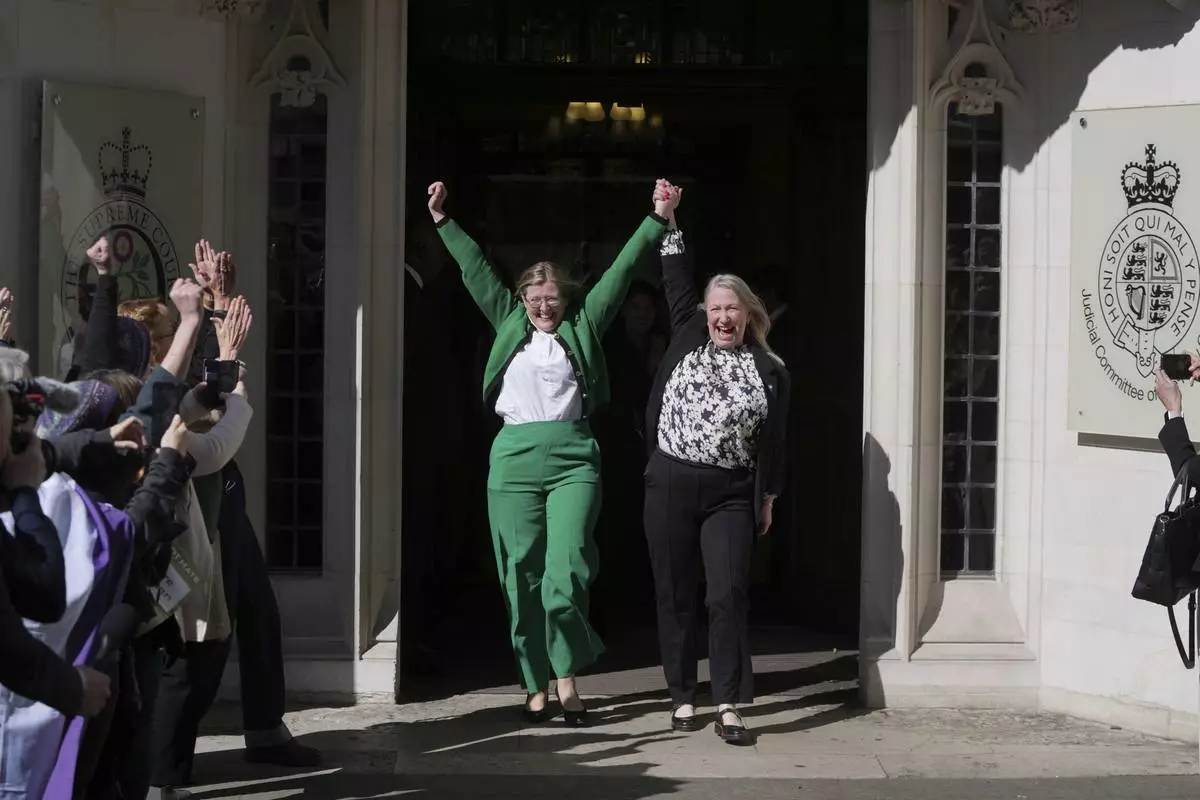
Marion Calder and Susan Smith from For Women Scotland, celebrate outside the Supreme Court to challenge gender recognition laws, in London, Wednesday, April 16, 2025. For Women Scotland is challenging the Scottish Government over whether trans women can be regarded as female for the purposes of the 2010 Equality Act. (AP Photo/Kin Cheung)
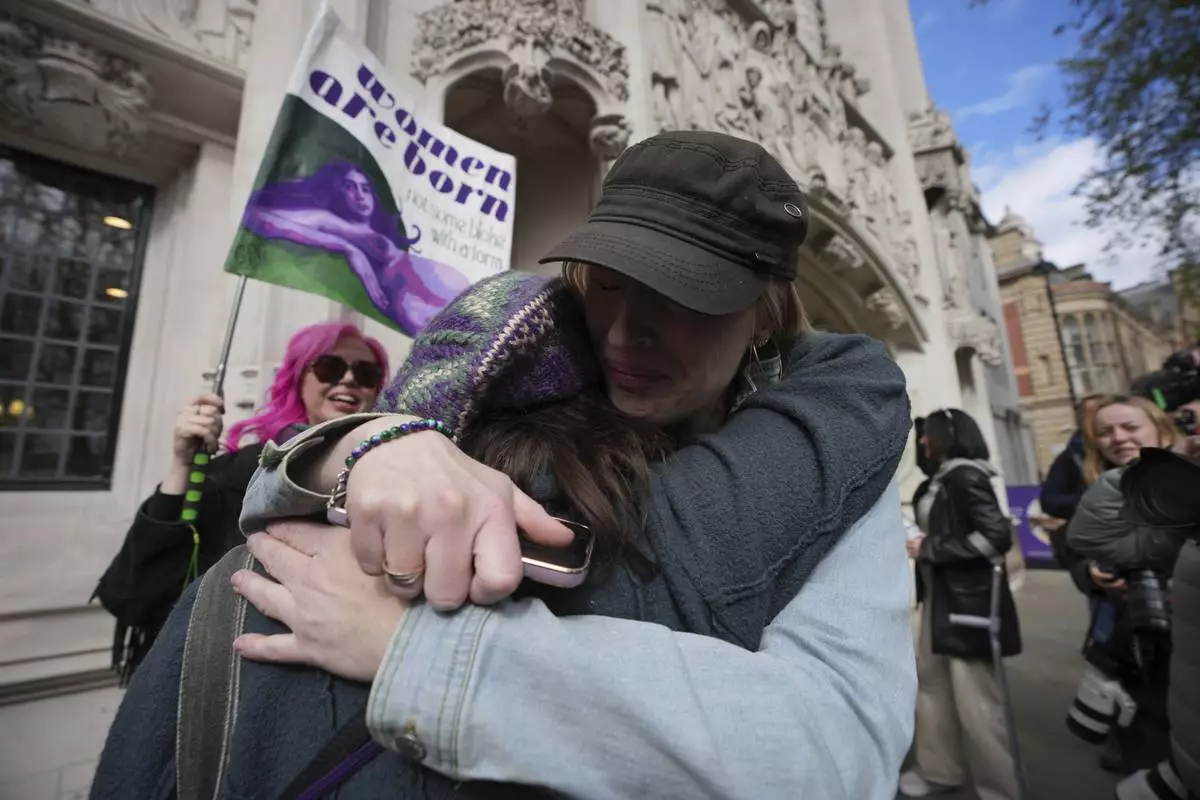
Women's rights activists celebrate outside the Supreme Court to challenge gender recognition laws, in London, Wednesday, April 16, 2025. (AP Photo/Kin Cheung)
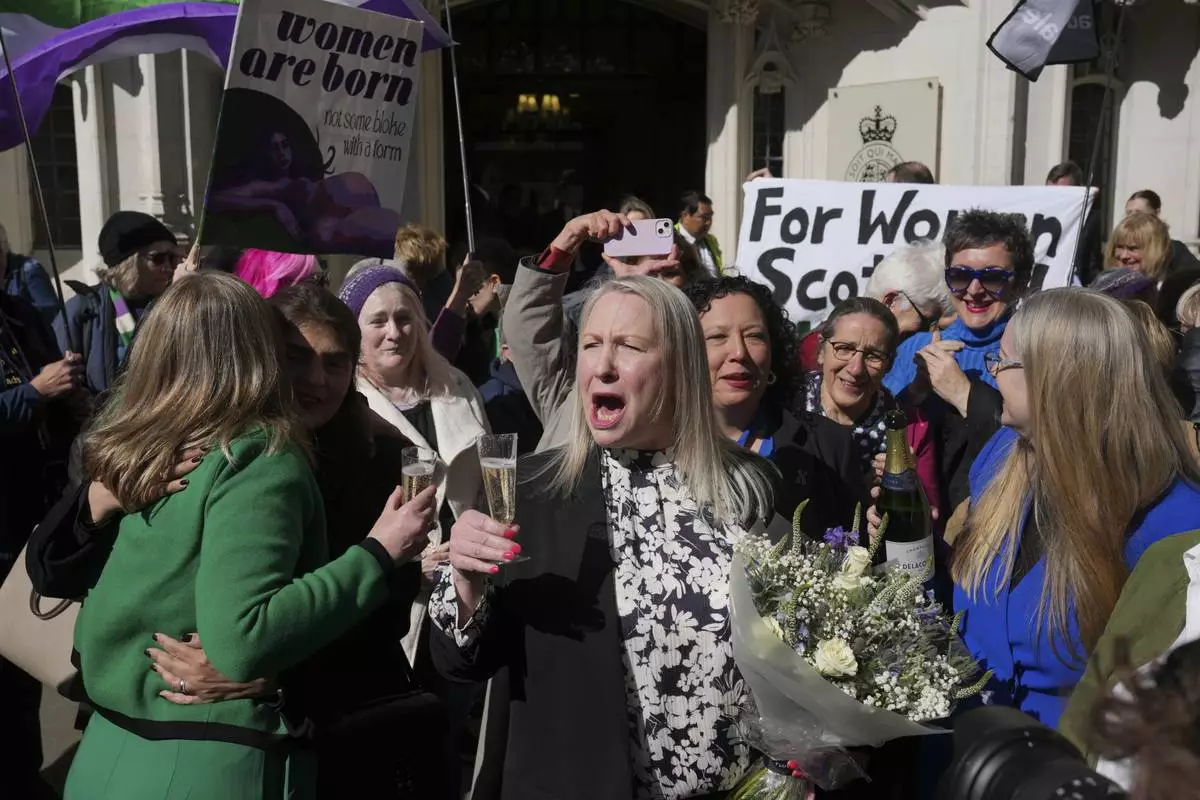
Marion Calder, center, and Susan Smith, left, from For Women Scotland, celebrate outside after the U.K. Supreme Court ruled that a woman is someone born biologically female, excluding transgender people from the legal definition in a long-running dispute between the feminist group and the Scottish government, in London Wednesday, April 16, 2025. (AP Photo/Kin Cheung)
ATLANTA (AP) — A pregnant woman in Georgia who was declared brain dead after a medical emergency has been on life support for three months to let the fetus grow enough to be delivered, a move her family says a hospital told them was required under the state's strict anti-abortion law.
With her due date still more than three months away, it could be one of the longest such pregnancies. Her family is upset that Georgia’s law that restricts abortion once cardiac activity is detected doesn’t allow relatives to have a say in whether a pregnant woman is kept on life support.
Georgia’s so-called “heartbeat law” is among the restrictive abortion statutes that have been put in place in many conservative states since the Supreme Court overturned Roe v. Wade three years ago.
Adriana Smith, a 30-year-old mother and nurse, was declared brain-dead — meaning she is legally dead — in February, her mother, April Newkirk, told Atlanta TV station WXIA.
Newkirk said her daughter had intense headaches more than three months ago and went to Atlanta's Northside Hospital, where she received medication and was released. The next morning, her boyfriend woke to her gasping for air and called 911. Emory University Hospital determined she had blood clots in her brain and she was declared brain-dead.
Newkirk said Smith is now 21 weeks pregnant. Removing breathing tubes and other life-saving devices would likely kill the fetus.
Northside did not respond to a request for comment Thursday. Emory Healthcare said it could not comment on an individual case because of privacy rules, but released a statement saying it “uses consensus from clinical experts, medical literature, and legal guidance to support our providers as they make individualized treatment recommendations in compliance with Georgia’s abortion laws and all other applicable laws. Our top priorities continue to be the safety and wellbeing of the patients we serve.”
Smith's family says Emory doctors have told them they are not allowed to stop or remove the devices that are keeping her breathing because state law bans abortion after cardiac activity can be detected — generally around six weeks into pregnancy.
The law was adopted in 2019 but not enforced until after Roe v. Wade was overturned in the 2022 Dobbs v. Jackson Women’s Health Organization ruling, opening the door to state abortion bans. Twelve states are enforcing bans on abortion at all stages of pregnancy and three others have bans like Georgia's that kick in after about six weeks.
Like the others, Georgia's ban includes an exception if an abortion is necessary to maintain the woman's life. Those exceptions have been at the heart of legal and political questions, including a major Texas Supreme Court ruling last year that found the ban there applies even when there are major pregnancy complications.
Smith's family, including her five-year-old son, still visit her in the hospital.
Newkirk told WXIA that doctors told the family that the fetus has fluid on the brain and that they're concerned about his health.
“She’s pregnant with my grandson. But he may be blind, may not be able to walk, may not survive once he’s born,” Newkirk said. She has not said whether the family wants Smith removed from life support.
Monica Simpson, executive director of SisterSong, the lead plaintiff in a lawsuit challenging Georgia’s abortion law, said the situation is problematic.
"Her family deserved the right to have decision-making power about her medical decisions,” Simpson said in a statement. “Instead, they have endured over 90 days of retraumatization, expensive medical costs, and the cruelty of being unable to resolve and move toward healing.”
Thaddeus Pope, a bioethicist and lawyer at Mitchell Hamline School of Law in St. Paul, Minnesota, said while a few states have laws that specifically limit removing treatment from a pregnant woman who is alive but incapacitated, or brain dead, Georgia isn't one of them.
“Removing the woman's mechanical ventilation or other support would not constitute an abortion,” he said. “Continued treatment is not legally required.”
Lois Shepherd, a bioethicist and law professor at the University of Virginia, also said she does not believe life support is legally required in this case.
But she said whether a state could insist Smith remains on life support is uncertain since the overturning of Roe, which found that fetuses do not have the rights of people.
“Pre-Dobbs, a fetus didn’t have any rights,” Shepherd said. “And the state’s interest in fetal life could not be so strong as to overcome other important rights, but now we don’t know.”
The situation echoes a case in Texas more than a decade ago when a brain-dead woman was kept on life support for about two months because she was pregnant. A judge eventually ruled that the hospital was misapplying state law, and life support was removed.
Brain death in pregnancy is rare. Even rarer still are cases in which doctors aim to prolong the pregnancy after a woman is declared brain-dead.
“It’s a very complex situation, obviously, not only ethically but also medically,” said Dr. Vincenzo Berghella, director of maternal fetal medicine at Thomas Jefferson University in Philadelphia.
A 2021 review that Berghella co-authored scoured medical literature going back decades for cases in which doctors declared a woman brain-dead and aimed to prolong her pregnancy. It found 35.
Of those, 27 resulted in a live birth, the majority either immediately declared healthy or with normal follow-up tests. But Berghella also cautioned that the Georgia case was much more difficult because the pregnancy was less far along when the woman was declared brain dead. In the 35 cases he studied, doctors were able to prolong the pregnancy by an average of just seven weeks before complications forced them to intervene.
“It’ s just hard to keep the mother out of infection, out of cardiac failure,” he said.
Berghella also found a case from Germany that resulted in a live birth when the woman was declared brain dead at nine weeks of pregnancy — about as far along as Smith was when she died.
Georgia's law confers personhood on a fetus. Those who favor personhood say fertilized eggs, embryos and fetuses should be considered people with the same rights as those already born.
Georgia state Sen. Ed Setzler, a Republican who sponsored the 2019 law, said he supported Emory’s interpretation.
“I think it is completely appropriate that the hospital do what they can to save the life of the child,” Setzler said. “I think this is an unusual circumstance, but I think it highlights the value of innocent human life. I think the hospital is acting appropriately.”
Setzler said he believes it is sometimes acceptable to remove life support from someone who is brain dead, but that the law is “an appropriate check” because the mother is pregnant. He said Smith's relatives have “good choices,” including keeping the child or offering it for adoption.
Georgia’s abortion ban has been in the spotlight before.
Last year, ProPublica reported that two Georgia women died after they did not get proper medical treatment for complications from taking abortion pills. The stories of Amber Thurman and Candi Miller entered into the presidential race, with Democrat Kamala Harris saying the deaths were the result of the abortion bans that went into effect in Georgia and elsewhere after Dobbs.
Mulvihill reported from Cherry Hill, New Jersey. Associated Press journalists Lisa Baumann, Kate Brumback, Sharon Johnson and Charlotte Kramon contributed.

Emory University Hospital Midtown is seen on Thursday, May 15, 2025, in Atlanta. (AP Photo/Brynn Anderson)

Emory University Hospital Midtown is seen on Thursday, May 15, 2025, in Atlanta. (AP Photo/Brynn Anderson)

Emory University Hospital Midtown is seen on Thursday, May 15, 2025, in Atlanta. (AP Photo/Brynn Anderson)

Emory University Hospital Midtown is seen on Thursday, May 15, 2025, in Atlanta. (AP Photo/Brynn Anderson)
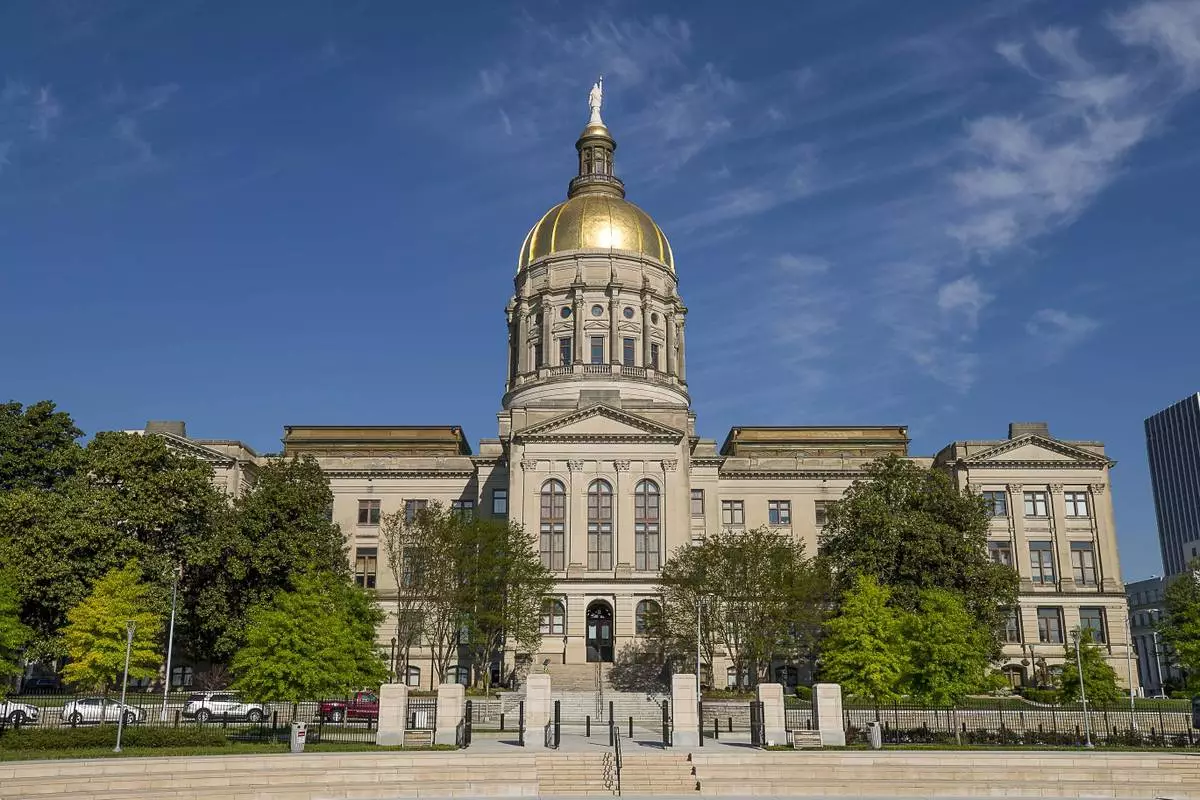
FILE - The Georgia State Capitol is seen from Liberty Plaza in downtown Atlanta, April 6, 2020. (Alyssa Pointer/Atlanta Journal-Constitution via AP, File)











